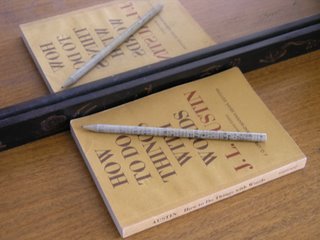 In his essay, "The Meaning of Working Through the Past," (1960) Theodor Adorno teases out the systems of avoidance at work in West Germany after the war. One aspect of denying the past its due consideration is a language of obfuscation that denies the past its immediacy. This language interferes with the critical self-reflection necessary to truly engage with the causes of the murderous disaster. For Adorno, the "mitigating expressions and euphemistic circumlocutions" turn the means of making the past present into a "hollow" discourse, or the death's head of thought. Forgetting becomes a thing done with words and not just a matter of their absence. More than for anything else, Adorno's fame or infamy can be traced back to his 1949 observation that culture turned rancid in the wake of Auschwitz. Then, he wrote:
In his essay, "The Meaning of Working Through the Past," (1960) Theodor Adorno teases out the systems of avoidance at work in West Germany after the war. One aspect of denying the past its due consideration is a language of obfuscation that denies the past its immediacy. This language interferes with the critical self-reflection necessary to truly engage with the causes of the murderous disaster. For Adorno, the "mitigating expressions and euphemistic circumlocutions" turn the means of making the past present into a "hollow" discourse, or the death's head of thought. Forgetting becomes a thing done with words and not just a matter of their absence. More than for anything else, Adorno's fame or infamy can be traced back to his 1949 observation that culture turned rancid in the wake of Auschwitz. Then, he wrote:
“Cultural criticism finds itself faced with the final stage of the dialectic of culture and barbarism. To write poetry after
Later he revised this suggestion, tempering it with the admission that torture demanded its scream, horror its poetic response:
“Perennial suffering has as much right to expression as a tortured man to scream; hence it may have been wrong to say that after
Perhaps no figure has been as closely associated with the phrase "poetry after Auschwitz" than the survivor, Paul Celan. His poetry's euphony may well still strike some as something transcendent if not barbaric. His insistence, however, is on the formulations of language that the dangerous talk of destruction and denial--which Adorno himself recognizes as a primary harbor of fascist tendencies--left in its wake. Accepting the Literature Prize of Bremen in 1958 Celan said of that which remained in the aftermath of "death-bringing speech":
"A poem, as a manifestation of language and thus essentially dialogue, can be a message in a bottle, sent out in the—not always greatly hopeful—belief that somewhere and sometime it could wash up on land, on heartland perhaps. Poems in this sense too are underway: theyare making toward something.
November 26, 2006
Doing Things with Words
Toward what? Toward something standing open, occupiable, perhaps toward an addressable Thou, toward an addressable reality.
Such realities, I think, are at stake in a poem. And I also believe that ways of thought like these attend not only my own efforts, but those of other lyric poets in the younger generation. They are the efforts of someone who, overarced by stars that are human handiwork, and who, shelterless in this till now undreamt–of sense and thus most uncannily in the open, goes with his very being to language, stricken by and seeking reality."
Picking up the shards of language, Celan's poetry was never an attempt to return to some lyricism that managed to dwell outside history. Rather it was to move lyricism through the destruction Adorno insisted upon acknowledging. Celan becomes, in this light, a muse of reckoning, a means of making words carry one toward seeing the past in its horror.